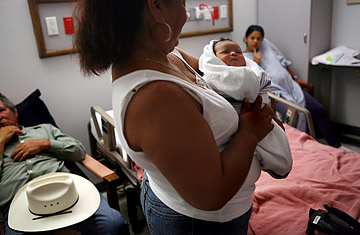
A Mexican woman holds her granddaughter, an American citizen. The child's parents crossed the Mexico-U.S. border into Texas to deliver their baby at a Catholic family clinic that specializes in prenatal care and delivery using natural childbirth techniques, but they had to transfer to a hospital because of complications
(2 of 2)
English and then American courts consistently followed that rule for centuries. But Britain began saying in 1981 that people born there could not automatically become citizens unless at least one parent was already a citizen or permanent resident, and the U.S. Supreme Court held in 1857 that slaves could not be citizens even when born here. The infamous Dred Scott decision rested in part on the idea that the framers of the Constitution had chosen not to make slaves citizens. This idea of choice was clearly contrary to the rule of birthright citizenship, and Congress essentially rejected it through the Civil Rights Act of 1866 and, more definitively, through the adoption of the 14th Amendment in 1868.
The Supreme Court resolved any remaining doubts about birthright citizenship — and the 14th Amendment — in the 1898 case of Wong Kim Ark, a man born in the U.S. to Chinese parents. Wong was in his 20s when he left his San Francisco home in 1894 to visit China. He tried to return the next year but was denied re-entry to the U.S. because he was "not, under the laws of the state of California and of the United States, a citizen thereof," his mother and father "being Chinese persons, and subjects of the Emperor of China," customs officials said. But the Supreme Court ruled that Wong had in fact acquired American citizenship at birth, and that citizenship had "not been lost or taken away by anything happening since his birth" — namely, the Chinese Exclusion Act of 1882, which had strongly limited Chinese immigration into the U.S.
The court went on at length about Calvin's case and British common law and confirmed that the 14th Amendment meant what it said — and what supporters and opponents stated in congressional debates that they believed it said. While residing in the United States, pretty much everyone is "subject to the jurisdiction thereof," because they must obey U.S. law. Under the 14th Amendment, the only exceptions are the children of diplomats (who have diplomatic immunity) and invaders and people born on foreign ships or to members of Indian tribes. (Tribes are sovereign nations, and Congress excluded their members' children in a compromise designed to preserve tribal independence.) The justices concluded that the 14th Amendment "affirms the ancient and fundamental rule of citizenship by birth within the territory ... including all children here born of resident aliens."
The court didn't mention undocumented immigrants, but 84 years later, it held in Plyler v. Doe that the amendment's citizenship clause applied to their American-born children as well as to anyone else "subject to the laws of a state." In 1985 the court again said kids born in the U.S. to undocumented parents were American citizens.
Despite the weight of history and legal precedent, opponents of birthright citizenship seem hell-bent on getting the courts to reconsider the 14th Amendment and put the U.S. in step with most of the world. Only about 30 nations grant automatic citizenship to the children of undocumented parents, according to the Center for Immigration Studies, and no European country does. Most nations assign babies the citizenship of their parents or require illegal immigrants to be longtime residents before their kids can be born citizens. Others simply require government consent — a system with uncomfortable echoes of the Dred Scott decision.
There are lots of options — some that might even curb illegal immigration. But if that's the goal, legislators can do better than pursue policies that prompt costly litigation, rehash debates over slavery and, ultimately, slight the Constitution they claim to revere.
